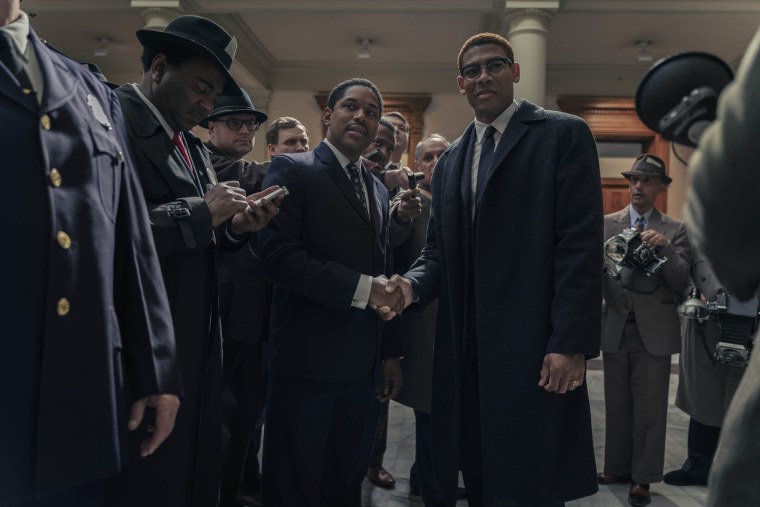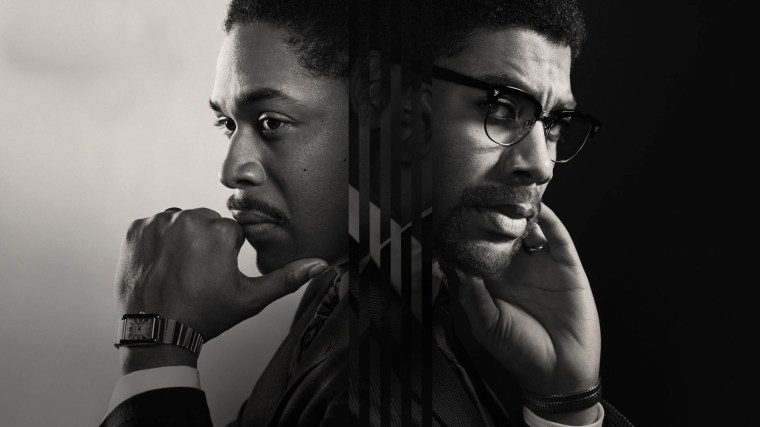For many Black Americans, the legacies of Martin Luther King Jr. and Malcolm X are inextricably linked. Yet the two men’s only documented meeting, on March 26, 1964, was an unintentional one. With the ongoing Senate debate on the Civil Rights Act of 1964, the two crossed paths briefly, posing for the only photographed moments of them together.
Less than a year later, Malcolm X would be dead, with King following three years after. Sixty years since, they are still looming figures in our history. And “MLK/X,” Season 4 of National Geographic’s acclaimed “Genius” series starring Kelvin Harrison Jr. and Aaron Pierre, takes a deep dive into why.
The dual approach is a departure from the singular focus of the series, which has highlighted Albert Einstein, Pablo Picasso and Aretha Franklin. Tackling the genius of King and Malcolm X simultaneously in the series came from Hollywood power couple and series executive producers Gina Prince-Bythewood and Reggie Rock Bythewood. A critical blueprint for the series is the play “The Meeting,” which ran on PBS’s prestigious “American Playhouse” back in 1989. Jeff Stetson, who wrote the play about a fictional meeting of the two giants, is an executive producer. Raphael Jackson Jr. and Damione Macedon, whose credits include the Starz series “Power,” are the series’ showrunners.

“So often we’re asked to choose between Dr. King and Malcolm X, and so many of us don’t realize that they’re really two sides of the same coin,” said “Woman King” director Prince-Bythewood.
Although both men believed this country treated Black people unjustly, the way they sought justice differed. Nonviolence became King’s philosophy and strategy, while the Nation of Islam minister believed in armed self-defense. Early on, he also advocated for Black nationalism, autonomy and separatism, even vilifying white people. King, on the other hand, was viewed as an integrationist who believed that white and Black people could address those injustices together and eventually live side by side.
“They both had the same objective,” Prince-Bythewood continued. “They were just going about it differently. Yet, towards the end of their lives, they were so much more alike than separate and really coming together. That iconic picture was really our jumping-off point of the two of their first and only meeting. So we really wanted to show the importance of both men and to take the villainization off of Malcolm X.”
Prince-Bythewood added they also wanted to amplify Betty Shabazz and Coretta Scott King’s “importance in not just their husbands’ lives, but the movement itself.”
The series’ level of historical accuracy was intentional. Bythewood said they assembled a “think tank” of scholars and activists that included historian Peniel E. Joseph, author of the critically acclaimed “The Sword and the Shield: The Revolutionary Lives of Malcolm X and Martin Luther King Jr.,” and Ambassador Attallah Shabazz, the eldest daughter of Malcolm X and Betty Shabazz, among many others.
Still, Bythewood, whose most recent credits include Apple TV’s AAU basketball series “Swagger” with NBA great Kevin Durant, shared that he and Prince-Bythewood didn’t want to rely solely on what was in the history books.
“It’s also just really amazing to just get certain things from their personal lives, just little nuances that a lot of us didn’t know,” Bythewood said. “There were just very specific things in their personal lives that really helped shape who they are.”
To bring these two icons to life, actors Harrison and Pierre also turned to both history and the personal. Harrison, a New Orleans native, credits spending time in Atlanta, the civil rights leader’s home turf, with helping him connect with King in a way that reading a book could not. “That helped me in such a real way and gave me such a close proximity to the truth, a close proximity to the excitement and the fire and the passion and the spirituality,” Harrison said.
British actor Pierre found his grounding through reading “The Autobiography of Malcolm X: As Told to Alex Haley” and Joseph’s book, as well as “watching the Malcolm X documentary that was guided by Dr. Betty Shabazz, watching endless footage of speeches and panels and interviews.” By being in New York, he also got a sense of Malcolm X, the man.
Pierre walked the streets of Harlem, going past where Temple No. 7 was located, visiting where Malcolm X was assassinated at what used to be the Audubon Ballroom. “That was such a beautiful experience just to embrace that energy, feel empowered by that energy, and it fueled me to really go and embark on this massive journey with a lot of love and confidence,” Pierre said.
Instead of collapsing under the pressure of trying to match the portrayal by Denzel Washington, a personal hero, in the 1992 film “Malcolm X,” Pierre said he looked inward to make it his own. He also had the privilege of working closely with award-winning “This Is Us” actor Ron Cephas Jones, whose turn as Elijah Muhammad was one of his last roles.
“Not only was he so generous from an artistic standpoint of imparting advice and guidance in that respect, but he was also incredibly open with me, like an on-set father to me, in giving me personal insight and personal advice and guidance,” Pierre said. “I’m deeply grateful for him.”
British Nigerian “I May Destroy You” actor Weruche Opia, who plays Coretta Scott King, and Jayme Lawson, who plays Betty Shabazz and previously portrayed Michelle Obama in “The First Lady” and Myrlie Evers in “Till,” both said they embraced the challenge of their roles.
Lawson said she was especially happy to show the intimacy between Shabazz and her husband, particularly “how giddy she was for Malcolm.” In a world in which Black women are so often portrayed as just “these strong, resilient, stoic women,” she said, it was a refreshing to learn he was a “safe space” for her, that she could express “the fullness of our womanhood, the girlish smiles” with him in private.
“He was impressed by the way in which she saw him,” Lawson added. “Everybody else saw this great man of a movement or ascending in a movement, but she saw him.” In turn, she made sure he ate and took care of himself so that he had the strength not to be crushed under that weight.
Opia found another side to King’s better half. “Coretta Scott King definitely did a lot more than the world tells us she did. I was ashamed that I didn’t know that, but here we are at this point and I’m correcting it by retelling the information I found out,” Opia said. “I don’t want anyone not to know who she is anymore.”
One of the main goals with “the Big Four,” as Prince-Bythewood calls these iconic husbands and wives, was to “take them off the pedestal and make them real for audiences to connect with.”
Two episodes of “MLK/X” drop every Thursday on National Geographic and then replay on Hulu and Disney+ the next day throughout Black History Month.
